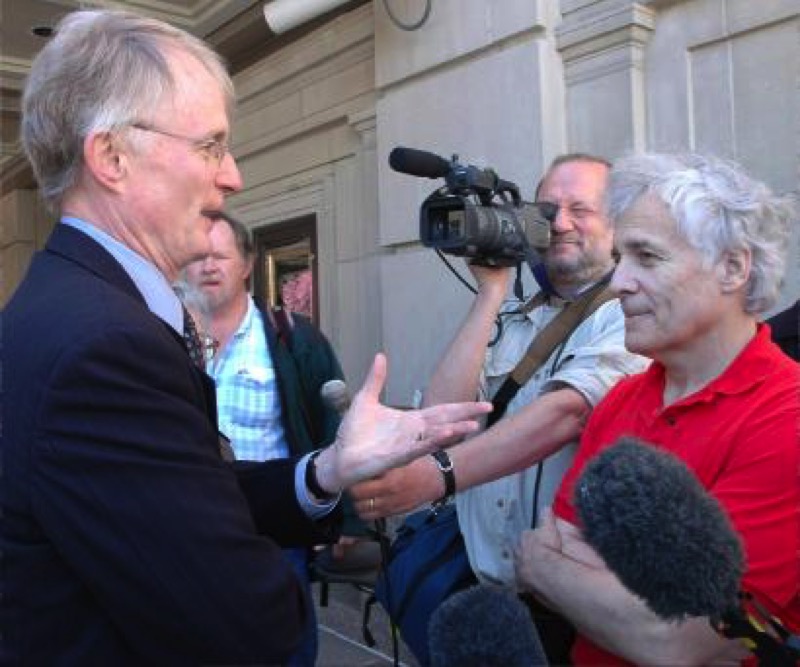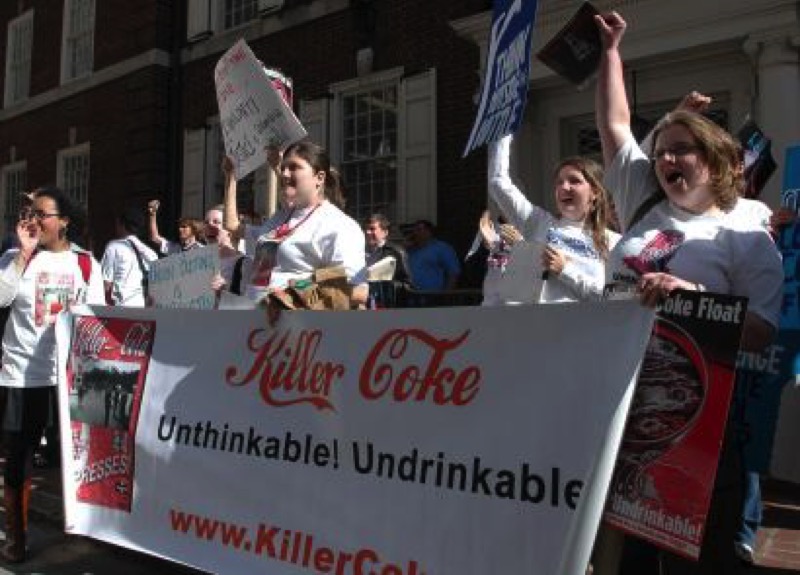Coke CEO extols mostly positive numbers
By Caroline Wilbert | Atlanta Journal-Constitution | 4/20/06
2006 a key year: Despite problems in Japan and elsewhere, 'we are well on our way to becoming [what] you expect us to be,' Isdell tells shareholders.
WILMINGTON, Del. — This year is critical for Coca-Cola Chairman and CEO Neville Isdell, who has long promised that his turnaround efforts would begin bearing fruit in 2006.
On Wednesday, he announced mostly positive results for the first quarter in the early morning and then faced a crowd of about 400 at Coke's annual meeting here a few hours later.

"My message to you today is that the transition is complete," said Isdell, who took the helm of Coke nearly two years ago. "We have made substantial progress over the last 23 months, and our results from the first quarter of 2006 demonstrate that we are well on our way to becoming the company you expect us to be."
Coke said that first-quarter profit rose 10 percent to $1.1 billion, or 47 cents a share. Excluding charges related primarily to Asian bottling operations assets and investments, the company earned 49 cents, a penny ahead of analyst expectations.
Revenue was flat at $5.2 billion. The company attributed its lackluster revenue figure to a change in the bottling structure in Spain.
The company grew its sales volume — a key indicator in the beverage industry measuring the number of cases sold — by 5 percent. Coke continues to post strong volume growth in emerging markets of China, Brazil, Turkey and Russia. The company also said it is pleased with the performance in Australia, where new product Coke Zero has been a success.
Problem markets continue to be the Philippines, India and Germany. Also, Japan, one of Coke's most important markets, had a sales volume decline of 2 percent. The problem there is that Coke relaunched a major product, Georgia Coffee, and the new look and marketing campaign did not do well.
"We confused our core consumer base," Isdell said about Georgia Coffee during a conference call with analysts and the media. He said the company is working to address the situation and expects to return to volume growth in Japan in the second quarter.
In North America, Coke grew sales volume by 2 percent.
John Faucher, an analyst at JPMorgan, said in a report that Coke is making progress in stabilizing and improving the business. "The company is beating expectations despite weakness in some key markets, and if those markets stabilize, there could be more significant upside," he said.

Stifel Nicolaus & Co. analyst Mark Swartzberg, however, called the quarter "uninspiring" and said in a report that he is particularly concerned about Japan.
Coke also said that it intends to buy back between $2 billion and $2.5 billion in shares this year and will increase its quarterly dividend by 11 percent, to 31 cents per common share.
Though Isdell said the company is now on the right track, he acknowledged there is more work to be done.
"Our company has made substantial progress toward sustainable growth since we gathered here last year," Isdell said. "To be sure, we still have a long way to go."
Indeed, investors still have to be convinced. The company's stock, which peaked at $87.94 per share in July 1998, has been stuck in the $40 to $50 range in recent years. Its shares closed Wednesday at $41.69, up 39 cents.
At the annual meeting, which was held in a fancy ballroom at the Hotel du Pont, Isdell focused most of his opening remarks on Coke's financial performance and business strategy. He talked about the company's increased emphasis on innovation — including the recent launch of a coffee-cola drink called Coca-Cola Blak in the United States — and the new marketing campaign, "Welcome to the Coke Side of Life."
Isdell told the crowd that after he took the helm of Coke in June 2004, his first job was to stabilize the company.
"This had to do with resolving a number of long-standing issues that were negatively affecting the day-to-day operation of our business, from legal investigations by the U.S. Department of Justice and the European Union to changes in marketing and operating leadership to morale problems throughout the company, particularly in our head office and in North America."
Isdell was referring to an EU investigation of antitrust allegations that was settled in 2004 and to federal investigations of Coke's accounting practices that the company resolved about a year ago by agreeing to change some disclosure practices.
The second phase of his turnaround strategy was to strengthen the structure of the business, including investing more in marketing and innovation, he said. Isdell began last year allocating an additional $400 million annually to marketing and innovation.
Most of the questions and comments from the audience focused on controversial matters, including allegations that Coke was complicit in violence against union members in Colombia that goes back to 1996, a charge that Coke has adamantly denied.
Ray Rogers, a well-known activist who has helped stir up protests on college campuses about the Colombia issue, was the first audience member to speak.
"The Coca-Cola brand name is being tarnished and the damage is only going to get worse," he shouted.
He called Coke's recent announcement that the International Labor Organization, an agency within the United Nations, will conduct an independent review of what happened in Colombia, "a new scam."
Isdell responded, "I can't think that engaging the ILO is a publicity stunt. ... We think we've gone to the most credible people in the world to look into what has happened in Colombia."
Outside the hotel, several dozen protesters chanted and carried signs before and after the meeting. One sign said, "Union busting is disgusting."
FAIR USE NOTICE. This document contains copyrighted material whose use has not been specifically authorized by the copyright owner. The Campaign to Stop Killer Coke is making this article available in our efforts to advance the understanding of corporate accountability, human rights, labor rights, social and environmental justice issues. We believe that this constitutes a 'fair use' of the copyrighted material as provided for in section 107 of the U.S. Copyright Law. If you wish to use this copyrighted material for purposes of your own that go beyond 'fair use,' you must obtain permission from the copyright owner.











